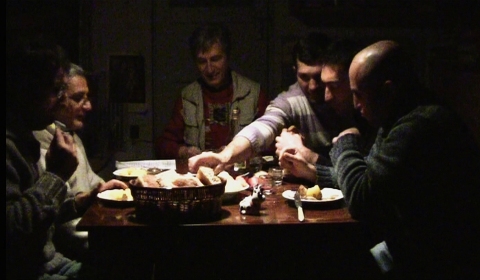[film / présentation]
Thursday June 13th, 8pm
At Ciné 104, as part of the Côté court festival
The Côté court festival has given Romana Schmalisch carte blanche this year. The artist will present “Cinema has no homeland” with films by Art Laboratory Yerevan, Eléonore de Montesquiou, Robert Schlicht/Romana Schmalisch and archives from the film collection of the French Communist Party (PCF); she developed this scheduling in parallel to her project currently at Les Laboratoires. 
Politicizing the toasts 2 (DR)
“A historical witness, cinema reflects historical moments, conflicts, changes that affect society and, at the same time, its own historicity. The films in this program provide so many different views of the Soviet Union and Russia, its structures, conflicts and turning points in its history – viewpoints from outside this country looking in. They touch on historic times but through that also provide an individual and current point of view. As producers of this historiography, the directors take a position on political events and actively contribute to the writing of history from their own perspective. The schedule brings together films dealing with different periods and traces what ties exist between the 1930s and today, providing a contemporary rereading of the past. The medium of film overcomes distance, nationality and time and these films layer projections of different models for society, analysing and shedding light on current political conditions.”
Politicizing the toasts - Art Laboratory Yerevan, 2012 - 03 min.
Artlab’s video performances are allegories in which members of the group talk about politics, make toasts or recite poems for ironic effect.
Politicizing the toasts 2 - Art Laboratory Yerevan, 2012 - 02 min.
Discussion about the opening of the “Putin club”.
Politicizing poetry - Art Laboratory Yerevan, 2012 - 02 min.
A video performance that uses poetry alone to talk about contemporary social and political problems.
Gazette - Eléonore de Montesquiou, 2009 - 04 min.
Dora Grafova, nearly 80 years old, recalls the many magazines she subscribed to during the Soviet period. The 17 monthly publications she received covered a range of subjects, from potatoes to women and technical progress.
Remember - Eléonore de Montesquiou, 2011 - 10 min.
19 January 2010 marked the first anniversary of the murders of Stanislav Mareklov and Anastassia Babourovain the middle of Moscow. A march was organised to commemorate the antifascist activists who defended human rights. It was painfully cold, we were rigidly kept in line by the army and our march dispersed quickly but it was a victory! For the first time, the roads of Moscow did not belong to the extreme right.
L'Exposition internationale des Arts et Techniques - Anonymous, 1937 - 21 min.
This film, a (tourist and ideological) presentation of the 1937 Paris Expo, carefully describes the many national pavilions and paints a picture of the pre-war international situation from the point of view of the French Communist Party. The extensive coverage of the Soviet pavilion was a pretext to sing the praises of the Soviet government and pay homage to its leaders. “Whoever is against the USSR is for the War […] Whoever is against the USSR is against human progress.”
Preliminaries - Robert Schlicht, Romana Schmalisch, 2011 - 48 min.
The film follows the history of the statue “Worker and Kolkhoz Woman” by Vera Mukhina. Originally designed for the 1937 Expo in Paris where it was erected facing the German pavilion, it was later brought to Moscow and became the emblem of Mosfilm, the largest film company in the Soviet Union.
+++
Mathilde Villeneuve, co-directrice des Laboratoires d'Aubervilliers, et Charlène Dinhut, coordinatrice des projets, participeront le 13 juin (15h30) à une table ronde de la journée professionnelle organisée lors du Festival Coté court. Plus d'informations ici.

